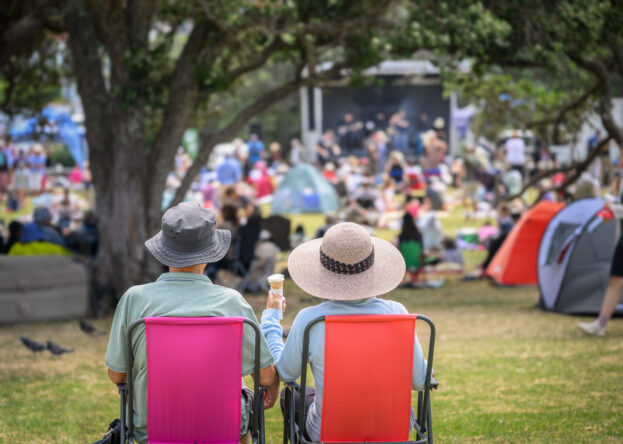Out Of Body Pop isn’t just another gig night—it’s a complete rethink of how music events can feel for neurodivergent fans.

Created by Will Soer, who has dyspraxia, this London-based series swaps dark clubs and chaotic crowds for something softer, more spacious, and genuinely accessible. With painting stations, re-entry options, and lower noise levels, it’s designed to support a wider range of sensory needs—without losing the joy of live music. Here’s how it’s quietly changing what a good night out can look like.
It’s designed to feel safe and spacious.

Out Of Body Pop deliberately keeps things small, bright, and low-pressure. Instead of a packed venue with booming speakers and flashing lights, you get natural daylight, gentle lighting, and plenty of space to move or step away. For people who feel overwhelmed in tight crowds, that alone makes a massive difference.
There’s no pressure to perform or stay in one spot. Some people dance, others paint or sit quietly and take it all in. It’s a gig that meets you where you’re at, rather than expecting everyone to handle the same intensity.
It blends music with creative activities.

These aren’t just passive gigs. Alongside live sets, there are areas for painting, drawing, movement workshops, or just relaxing quietly. The whole event encourages people to engage in whatever way feels good to them, whether that’s expressive or still, social or solitary.
This kind of multi-layered format allows attendees to drift between activities. If the music feels too much, there’s something else to do. If you need a minute, you’re not stuck. That sense of choice helps reduce anxiety and overstimulation.
It’s built from lived experience.

This isn’t a top-down inclusion policy—it’s a grassroots effort informed by people who know what it’s like to feel excluded from nightlife. Will Soer and other team members have firsthand experience with sensory sensitivity and social burnout. They’ve built a space they actually want to be in.
That makes a huge difference. The layout, pace, and structure of the events feel intuitive because they were designed by people who understand what most gigs get wrong. You don’t have to explain yourself or constantly manage your environment—it’s already been thought of.
Re-entry is allowed and encouraged.

One major anxiety trigger at gigs is feeling trapped. If you leave the room, will they let you back in? What if you miss something? At Out Of Body Pop, the freedom to step out and come back is part of the plan. Nobody makes a fuss, and you don’t need a reason.
It removes that low-level stress and makes pacing yourself much easier. Some people sit outside for ten minutes, regroup, and return when they’re ready. Others dip in and out throughout. That freedom is rare—and it matters.
Sound levels are actually manageable.

Loud music is a standard part of most live events, but for neurodivergent folks, it can tip into painful fast. Out Of Body Pop keeps the volume at a level that still feels immersive without becoming overwhelming. You can hear the music, but you can also think—and breathe.
If you do find it’s getting too much, there are quiet zones and side spaces where the noise drops away. Nobody expects you to push through discomfort. The event structure actively supports regulation, rather than leaving people to fend for themselves.
Staff understand the vibe.

It’s not just the audience that makes a space inclusive—it’s the people running it. Staff and volunteers are briefed on how to support attendees who may need space, breaks, or non-verbal communication. There’s a clear understanding that everyone navigates social settings differently.
There’s also a general sense of patience and calm throughout the venue. Nobody’s rushing you. Nobody’s confused if you need to step back. That level of understanding creates safety in ways that go beyond just physical space.
It builds real community.

For many neurodivergent people, traditional nightlife can feel more isolating than enjoyable. But Out Of Body Pop flips that by creating a space where connection is possible—on your terms. You’re not forced into loud, draining interactions. You’re just invited into a gentle, shared experience.
That makes it easier to meet like-minded people, to feel part of something, or to simply exist in a space that doesn’t demand constant masking. Whether you come alone or with friends, there’s a strong undercurrent of “you belong here.”
It’s a model for the future.

What Out Of Body Pop is doing isn’t just useful for neurodivergent fans—it’s a roadmap for how gigs could be better for everyone. Lower pressure, more flexibility, mixed sensory experiences—it’s the kind of setup that makes nights out more humane, full stop.
As awareness around neurodivergence grows, events like this show that inclusion doesn’t mean stripping away joy. It means making space for more people to access it. And that’s something the entire live music scene could learn from.




